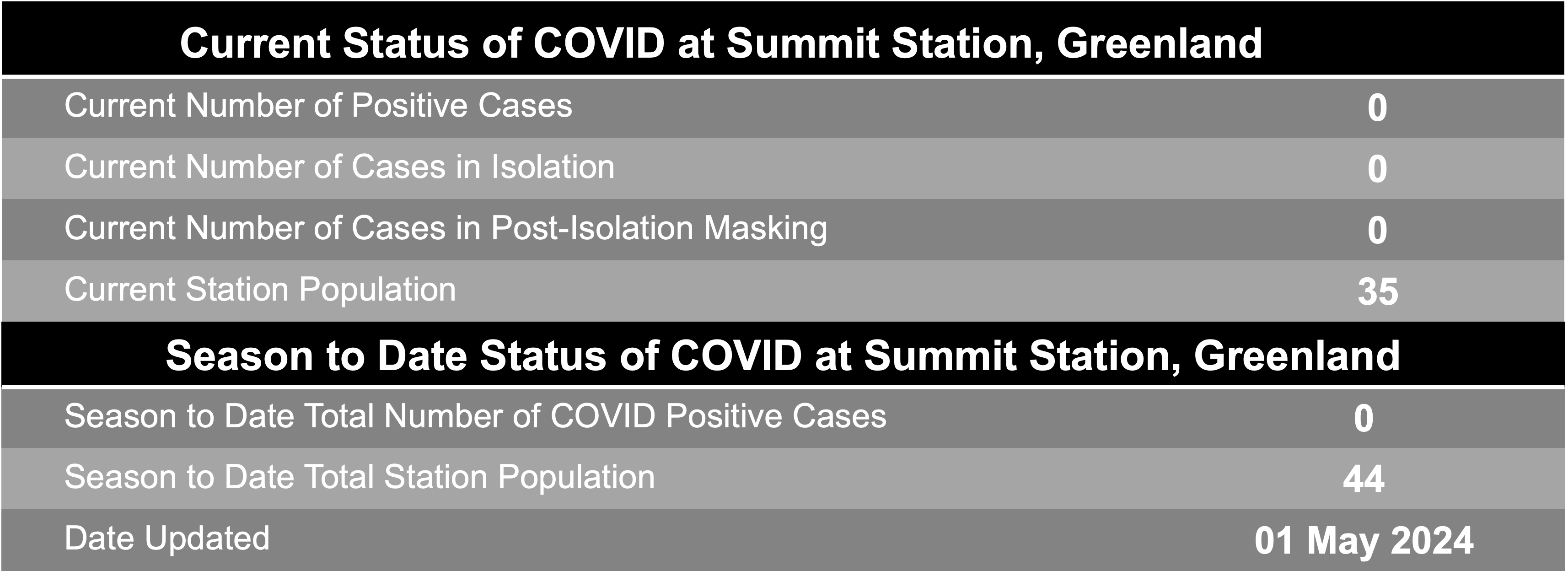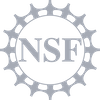COVID-19 Information
Please review the most recent information NSF has published regarding COVID-19 and research.
New variants of SARS-CoV-2, the virus that causes COVID-19, will continue to occur. Entering the 2024 Arctic summer deployment season, the approach to infectious disease mitigation will continue to be one of risk management through containment, symptom control, and disease management. The NSF has shifted from the goal of trying to prevent cases of COVID-19 at research stations or communities to a goal of resuming normal operations with good prevention practices in place and a robust plan to respond to COVID-19 cases at research stations and logistics hubs. Research projects in field camps are responsible for their own protocols and response to COVID-19. Vaccinations are required by the NSF for participants traveling to Kangerlussuaq and further afield, including Raven Camp or remote field camps, and anyone traveling to Summit Station.
Quarantines are no longer required for entry to research stations. Research teams may elect to arrange and pay for their own quarantine period, if desired. Without quarantines, there is increased likelihood that COVID-19 will reach research stations like Summit Station and Toolik Field Station. These documents describe the overall approach for reducing COVID-19 cases and managing those that arise. As with all prior years, program participants should comply with all national, state, local and tribal travel restrictions. All participants should have informed consent regarding the risks of contracting COVID-19 and research teams should have personal protective plans in place with the awardee institution’s risk management office concurrence that includes how the project will respond to COVID-19 infections.
Please select the appropriate document below to obtain a copy of the NSF travel procedures for your destination.
All other travelers should follow the applicable public health authorities' (e.g., host country, state, tribe, borough, city/village) COVID-19 guidelines in addition to the applicable NSF COVID-19 travel guidelines.
Photo by: Christopher Arp
Summit Station COVID Status

Risk Management
Safe operations in the Arctic are the result of careful planning and evaluation, detailed preparation, and a solid understanding and application of risk management principles. The Battelle ARO Team embodies a strong culture of risk management, exercised through the development and implementation of project-specific, custom-tailored risk management plans, coupled with well-established safety programs and innovative tools designed to support safe operations. These innovative risk- and safety-related tools will be woven into the Battelle ARO PM support plans for funded researchers and will include:
- Pre-deployment risk identification and mitigation plans
- Training recommendations, instructions and resources including this library.
- Pre-deployment medical clearance as required
- Access to telemedicine
- Allocation of safety gear - medical kits, survival bags, etc.
- In-field safety support
- Emergency preparedness and response measures
- Coordination with the Polar Geospatial Center (PGC) and the Cold Regions Research and Engineering Laboratory (CRREL) to obtain imagery and analysis of potentially hazardous and/or crevassed research sites.
- Follow the Arctic Program Firearm Protocol guidelines.
Photo by: Kevin Pettway
Field Safety Training
Battelle ARO provides field training courses, using in-house and third-party experts, based on the needs of researchers. In addition to the below courses, we can tailor a course to your group's needs. Contact the Field Risk Technician to discuss options that may suit your needs.
Wilderness Medicine
Battelle ARO provides field training courses, using in-house and third-party experts, based on the needs of researchers. In addition to the below courses, we can tailor a course to your group's needs. Contact the Field Risk Technician to discuss options that may suit your needs.
Environmental Compliance
Battelle ARO can assist proposing researchers to assess the environmental impacts of all types of projects. We have extensive experience with the National Environmental Policy Act (NEPA) and the capability to complete simple Environmental Assessments (EAs) to extremely complex programmatic Environmental Impact Statements (EISs). We have completed impact studies and regulatory approvals to support NEPA analysis, including Ecological Studies, Threatened and Endangered Species reviews and Section 7 Consultation, Archaeological Surveys and State Historic Preservation Office consultation and clearance, Wetland delineation and Section 404 Permitting, Surface and groundwater discharges and National Pollutant Discharge Elimination System (NPDES) permits and Geology and soil impact assessments. Please visit the following links to learn more about the NSF environmental review process for Arctic research and your responsibilities to comply if your proposal is successful:


